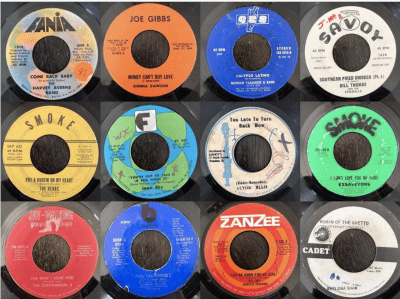Mister Cee (Photo by MikaV, CC BY-SA 4.0)
Remembering Mister Cee, the pioneering DJ who helped discover Biggie
Born and raised in Brooklyn, the hip-hop legend has passed away at the age of 57
Mister Cee, the trailblazing hip-hop DJ who was core to Brooklyn’s early 1990s rap scene, has passed away. The news was confirmed in the New York Times by Skip Dillard, the brand manager at WXBK 94.7 The Block NYC. No cause of death was given.
Born Calvin Lebrun in 1966, Cee grew up in the Bedford-Stuyvesant section of Brooklyn, a hotbed of burgeoning hip-hop culture from its earliest days. Throughout his life, he was a loud and proud Brooklynite, constantly reminding the public that, despite the Bronx’s insistence that hip-hop was immaculately conceived in that borough alone, Brooklyn had at least as much to do with raising the distinctly New York City phenomenon.
Lebrun was part of the generation that came of age in the early days of rap music, pre-global-takeover, and saw it grow in unfathomable ways, a transition that left many of those early pioneers baffled by the sea change and unable to keep up. But Lebrun was always able to ride the waves, and indeed, thrive as hip-hop grew.
A devotee of the groundbreaking radio shows that first broadcast rap (including WHBI’s World Famous Supreme Team and Awesome Two), Cee soon had a front row seat to one of the most influential radio shows of its time when he linked with a high school classmate to make music together, catching the ear of DJ Marley Marl, the engineer all-star for Mr. Magic’s wildly popular show on WBLS. Marley adopted the two into his crew and, as Big Daddy Kane and Mister Cee, the duo produced some of the most enduring rap classics of the era, many laced with Kane’s memorable shoutouts to his up-and-coming DJ (“Cee’ll scratch a record like flakes of dandruff” from “Warm It Up Kane” is this author’s favorite).
This late ’80s glory would have been enough to solidify his place in rap history, but Cee’s most legendary role was yet to come. By now a local hero who still resided in the ‘hood, Cee was firmly plugged into the circuit of young rappers looking for a break. One of these was another Bed-Stuy kid who called himself Biggie Smalls, after Calvin Lockhart’s character in the 1975 Poitier-Cosby vehicle “Let’s Do It Again.” Cee passed Biggie’s rough demo tape off to The Source Magazine’s Matty C, who featured it in his Unsigned Hype column. The tape caught the attention of uptown impresario Sean “Puffy” Combs, who quickly moved to sign the rapper, catapulting the Notorious B.I.G. into history. Cee was named as executive producer on Biggie’s debut album, “Ready To Die,” an acknowledgement of his indisputably crucial role in the ascent of the rap icon who himself was as unabashedly Brooklyn-centric as his mentor.
All the while Cee was releasing mixtapes, that now-anachronistic format that at the time was the bleeding edge of hip-hop’s musical evolution. His 1995 “Best of Notorious B.I.G.” tape was so popular that even the mighty Arista Records, who did not look kindly on the use of their copyrighted material on the tape, were forced to back down and allow it to swarm the streets, where it was a mainstay on car stereos and Walkmans alike. Attendees of Brooklyn Nets games are to this day bombarded with the rhetorical exhortative “Where Brooklyn at?!” — a Biggie line lifted from the infamous mixtape.
A seasoned club DJ who could be relied upon to set off any event, Cee was probably most at home on the radio, the job he’d dreamt of as a kid. He found his home at Hot97, where for an astounding 20 years he held primetime slots. His exit from the station in 2014 was brought about by what curiously could become yet another lasting legacy, this time unrelated to music.
In 2011 and 2013 Lebrun was arrested for soliciting prostitution, a situation that forced his listeners to confront an uncomfortable fact — not the rights of sex workers or the police targeting of minority neighborhoods, but that on each occasion Lebrun’s object of interest was a trans woman. The reactionary outrage from the notoriously homophobic hip-hop community was blistering. In the face of this misplaced gale of condemnation, Lebrun was unapologetic in his unruffled public attitude, looking his detractors in the eye and forcing them to confront, even on a small level, their own prejudices.
His conversation with rapper and talk show host Maino is refreshing in its clear-eyed and good-humored honesty (“I consider myself ‘try-sexual.’ I’ll try anything.”), even as Cee patiently and persistently attempts to educate his woefully wrongheaded interlocutor on the definition of a transexual woman. In its plain-spoken presentation of the reality and humanity of trans people, it is not an exaggeration to say Cee single-handedly brought trans visibility to the forefront of discussion in the hip-hop community.
A Brooklyn legend and an icon of hip-hop music, Mister Cee will be missed.
You might also like 


























